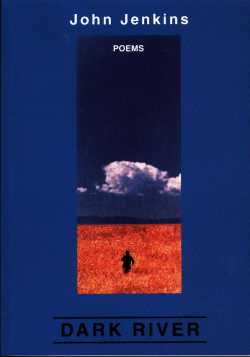 Dark River by John Jenkins
Dark River by John Jenkins
Five Islands Press, 2001
In John Jenkins' eighth collection, Dark River, the question he asks the reader is, 'Are we apes or cobalt clouds?' Throughout the collection, a poetic narrator directs the reader towards a continual reassessment of science and aesthetics. Thus, this collection reminded me somewhat of the 17th-century Metaphysical poets because of its ability to implicate the reader within the poem. Jenkins directs his verse behind a persona who describes this wonderland to 'you', the reader.
This persona continually asks the reader questions. His vision can be microscopic as well as vast, and he has an amazing ability to merge the cosmic and the personal into a poetry that is fluid and magical –
The watchman is seduced by starlight.
He dreams of intricacy, a final scale,
and ignores the simple perfume
of a tranquil beach.
('Seduced by starlight')
– or, in a description of time as a place –
Puddles of light articulate streets
Softly or alone, words are words
of amber, glass and liquid piano,
chosen for their effect or cadence,
the will a bright blue field
into which the weather disappears
('A Hope')
– Jenkins creates a style of symbolism that lacks the usual cloying touch of death and decadence. Instead he uses a lightness of touch, even naughtiness, as in 'Weeping Woman', where the subject of one of Picasso's paintings talks about her entrapment:
Sometimes I looked like a woman,
sometimes like a macaw,
or even a violin or a chair.
There are some brilliant images that are so crisp and light, they seem to float in the air. However, this collection is uneven and at its worst, some of the poetry is graceless and bulky. 'The Wine Harvest', for example, is especially dense for a modified pastoral vision. Likewise, 'Middle Yarra Tributary' is aimless, and in 'Zooplankton', Jenkins appears to be lost in the very lushness of his microscopic vision. This lack of focus in some of his poems can be annoying: sometimes Jenkins' touch can be too light, resembling a camera that moves too fast:
Kakadu sunrise, orange
juice, Email, pay-TV…
And eroding exchange rates
To rattle the Big Croc.
('Map')
These are merely disconnected phrases strung along in the semblance of a stanza. When Jenkins can connect this imagist style with his role as a narrator, he shines, as in 'Detour or Close shaves'.
His vision is of a lingering melancholy, and Jenkins is at his best when he encapsulates the human condition, as he does in 'Liquid landscape, Trance of light' when he states: 'We are tiny and surprised in our tents/of skin and hope…'. It is this surprise that Jenkins adeptly uses in his poetry.
John Jenkins also captures the sublime in his willingness to use language as an experiment. He isn't wary about science and he does not deify nature but instead gives it a narrative in which to operate. In doing so, he remoulds a scientific vocabulary and makes it beautiful. This playful mingling of science and poetry doesn't always work, but what Jenkins does do is to imbue the natural world with a new sense of wonder. In 'Walking on the water tension', the reader is invited to undergo a journey in which a new vocabulary is used, a new world where 'Hydra and Paramecium cut the millimetre down to size'.
Jenkin's vision is applied on a microscopic scale — normally innocuous organisms are given a new face when juxtaposed with a cosmic vision in which
…Many-levelled music of being
Here finds motile form. Leaps up stairs and airy
colonnades, as your eyes drink summer light
The narrator then seems to turn towards the reader, directing them towards involvement in the scene,
Then dissolve all this. Sink like a stone
Be low again. Complete the circle. See
strange harmonies of scale Or rise above it all,
It is an arresting image — the narrator is asking the reader to join him in the world he describes, a move comparable to Christopher Marlowe's 'Come live with me and be my love'. When modern poetry has lost this sensual entanglement of poet and reader, it is in this volume that Jenkins resembles a Virgil, showing us a microscopic underworld.
There is ultimately something gaudy about this collection — and I quite like it. Even Jenkins' failures are only caused by his endless ambition and these are easily offset by the brilliance of his more focused works. What Jenkins is willing to do is to give into a pure aestheticism, and I think the reader can easily forgive his whimsy for the pure energy of his work.
Scott Thornton holds a B.A (Hons) in English from UWA. He likes anime, Marvell, Donne and Merseybeat.









